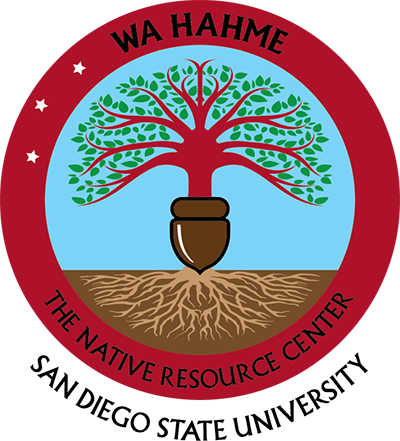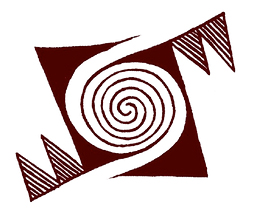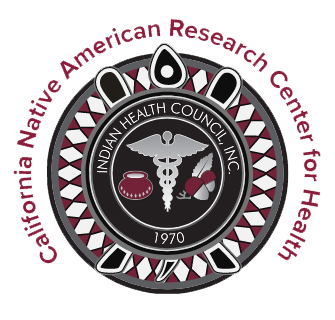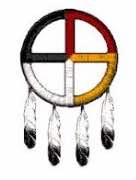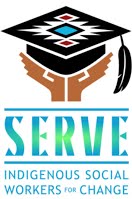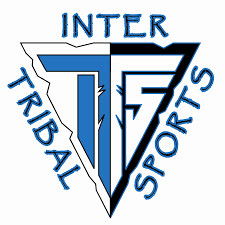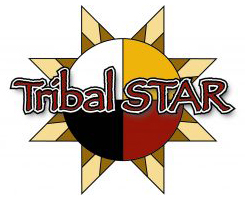
Outreach and Partners
The Department of American Indian Studies is proud to be partnered with and supported
by a number of non-profit and community-based organizations and programs. Request a collaboration with us.
Native Resource Center
The Native Resource Center at San Diego State University, facilitates the academic and personal success of Native American and Indigenous identified students through: relevant and accessible programming and resources, services to identify and address barriers to academic achievement, community building, on and off-campus partnerships, and advocacy for the inclusion of Native American/Indigenous peoples’ unique histories, cultures, and perspectives in campus programs and curriculum.
Visit the Native Resource Center website.
American Indian Recruitment (AIR) Programs
The American Indian Recruitment (AIR) Programs offers supplemental educational instruction through tutoring, mentoring, and various activities designed to achieve success within high school and higher education. Created in 1993 at SDSU, the AIR Program now also includes partnerships with the University of San Diego, the University of California, San Diego, California State University, San Marcos, and Palomar and Cuyamaca Community Colleges.
Visit the AIR Programs website.
Native American and Indigenous Faculty and Staff Association (NAIFSA)
The Native American and Indigenous Faculty and Staff Association fosters a welcoming and inclusive environment at San Diego State University for individuals who identify as Native American/indigenous. They are dedicated to communicating an understanding of the experiences of Native American and indigenous faculty, staff, and students, and facilitating awareness, education, and respect for their unique histories, cultures, and perspectives in order to create an environment in which the NAI community may thrive and prosper.
California Native American Research Center for Health (CA-NARCH)
The California Native American Research Center for Health (CA-NARCH) is a partnership of tribal/urban Indian organizations and academic institutions committed to working together to increase the number of American Indian/Alaska Native scientists and health professionals; and to reduce health disparities in Native American populations. The Indian Health Council, in partnership with SDSU and UCSD, is funded as a Native American Research Center for Health (CA-NARCH) by the National Institutes for Health (NIH) and Indian Health Services (IHS). It is one of 14 NARCH organizations in the United States. Under the leadership of Dan Calac, MD (Indian Health Council) and Stephanie Brodine, MD (SDSU), CA-NARCH began as an exciting concept funded by seed money in 2001. A NARCH grant of $1.3 million in 2003 enabled CA-NARCH to begin fully pursuing its goals to strengthen tribal sovereignty over the healthcare of the community and to recruit and support students pursuing science and health fields.
Native American and Indigenous Scholars Collaborative
The San Diego State University Native American and Indigenous Scholars Collaborative (NAISC) is part of the School Psychology program in the SDSU Department of Counseling and School Psychology. The NAISC program is designed to help reduce the profound gap in the numbers of school counselors and school psychologists appropriately trained to serve Native American and other Indigenous youth and communities. The NAISC Project provides a cross-level cohort model, Native American mentors, models, readings, ongoing specialty seminar, and supervised specialized field placements, emphasizing strength and resilience-based interventions that affirm the culture of the child and recognize the influences of historical trauma and colonization. Combined with graduate studies and coursework, students learn and use specialized knowledge to differentiate difference from disability, and to help design and deliver culturally appropriate pedagogical and psychological services. NAISC is supported by a grant from the U.S. Department of Education, Office of Special Education Programs.
SERVE: Indigenous Social Workers for Change
SERVE aims to recruit Indigenous students (Native American/Native Alaskan) into the Title IV-E Stipend Program with a specialization in Public Child Welfare. Title IV-E is part of the Social Security Act managed by the Administration for Children and Families of the U.S. Department of Health and Human Services. SERVE envisions Tribal sovereign nations and indigenous communities as sustainable healthy communities that use healing interventions to provide empowerment, mentorship, and leadership development; to promote cultural preservation and appreciation of Indigenous cultures by recognizing and supporting Tribal sovereignty, and protecting cultural rights and identity of Indigenous peoples. SERVE was initiated in 1981 at UC Berkeley through the American Indian/Alaskan Native Program in Social Welfare. In 1999, SERVE was adopted by CalSWED and grew into a statewide effort that operated from California State University, Stanislaus, where it helped to form collaborative working relationships with 67 of 110 California Tribal agencies.
Inter Tribal Sports (ITS)
ITS provides athletic opportunities and values education in conjunction with cultural, physical, mental, and spiritual development. ITS furnishes youth and communities with occasions to build self esteem, respect, acceptance, and sportsmanship through fun and positive activities, while developing athletic skill and forming friendships, guided by appropriate role models in a sound, structured program that is non-profit, volunteer-oriented, and open to all tribal youth.
Tribal STAR (Successful Transitions for Adult Readiness)
Tribal STAR is a program of the San Diego State University School of Social Work, Academy for Professional Excellence. Approximately 800 Tribal and non-Tribal professionals, leaders, public Human Service agency staff, regional training academy staff and university students have received training throughout the project. The training package provides up-to-date, research-based information in a variety of areas, including: the youth development philosophy, methods for collaboration, effective ways to work with rural populations, effective ways to work with Tribal rural foster youth and their communities, the Indian Child Welfare Act, and the John H. Chafee Foster Care Independence Act.
Visit the Tribal STAR website.
